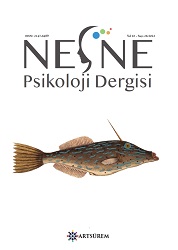Covid-19 Sıkıntısı ve Bilişsel Hatalar Arasındaki İlişkide Bilişsel Esneklik ve Kontrolün Aracı Rolü
The Mediating Role of Cognitive Flexibility and Control in the Relationship between the Covid-19 Distress and Cognitive Failures
Author(s): Hasibe Arıcan, Hatice KafadarSubject(s): Cognitive Psychology, Psychoanalysis, Health and medicine and law
Published by: Sanat ve Dil Araştırmaları Enstitüsü
Keywords: Mediation analysis; cognitive status; cognitive flexibility; anxiety; attention; perception;
Summary/Abstract: It is thought that reducing the cognitive errors of individuals affected by anxiety during psychological treatment is important for reducing cognitive errors in areas such as focusing and memory in daily life. In this study, it was aimed to examine the mediation effect of cognitive control and coping flexibility on emotions in the relationship between Covid-19-related anxiety and cognitive status, via the structural equation model. The participants of the study consisted of 585 people, 245 male and 351 female. The age range was 18-64 and the mean age of the participants was 32.08 (SS= 10.92). Covid-19 Distress Scale, Cognitive Failures Scale and Cognitive Control and Flexibility Scale were used. For the mediation analysis, Hayes' (2014) Model 4 was analyzed using Process Macro in SPSS. As a result of the analysis, it was found that cognitive control mediated the relationship between Covid-19 anxiety and cognitive errors. It is thought that the results of the current study may play an important role in reducing anxiety and cognitive errors by studying the cognitive flexibility and control skills of individuals and will contribute to the planning of health policies and necessary individual interventions.
Journal: Nesne-Psikoloji Dergisi
- Issue Year: 10/2022
- Issue No: 26
- Page Range: 555-572
- Page Count: 18
- Language: Turkish

